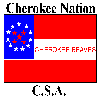

My Cherokee Genealogy
Index
My Grandmother ("Grammaw" as we called her) was one of the most influential people in my life. She was a Cherokee Indian. She was important not for teaching me the ways of her ancestors, which she did, but because of her love for all things living, and inanimate. She had the greatest love that I ever knew. She taught me how to love, and to learn, and to have respect. I wish I had paid closer attention, earlier in my life, when it mattered, while she was still here with me. She was a great lady to me. She died in 1964, and I still miss her. She was the light of my life. This is her story, and the story that she told me.
Her name was Mary Ellen Adair. She was born to Margaret Rogers "Granny Maggie" and William Penn Adair III on 18 Sep 1897. She was the only girl in a family of four children, and was named for her grandfathers twin sister. She came from a heritage that she was very proud of, and yet, she had seen the terrible tragedy that they had suffered over losing there land to the white settlers who came to Oklahoma at the turn of the century. She later married Samuel Earl Riddle a white man. They were married until he died in 1955.
Her family was neither rich nor poor, and likewise was her heritage. She was the daughter of three families that were among the Old Settlers faction of the Cherokee Nation West, and the Pro-Treaty or Ridge Party. Most did not suffer the trials of the Trail of Tears, because they were in their new "Cherokee country" early. All had fought on the side of the confederacy during the War Between the States, and had been active in Cherokee politics for many years, many as Chiefs, council members, delegates to Washington, D. C., and judges. Her Great Grandfather, Some had fought hard, and finally given up all hope of retaining the lands of the Cherokee people in the East. George Washington Adair, narrowily escaped being murdered by the pin Indians for being a part of the party that had signed the New Echota Treaty, which finally relinquished these home lands. You will find the treaty on my page as a link, listed below. I don't have the words of the "treat", but I have tried to convey what it meant, and how it would shape the lives of my ancestors. To this day the treaty is a very controversial part of the Cherokee Nation, and still causes splits among the people of the nation. I have learned that my ggggrandfather did what he thought was best for his people. He and Major Ridge, and the other signers, knew that the Cherokee people would be removed no matter what. Chief John Ross, thought they should stay and fight. Only one tribe did that. And that tribe suffered great losses. And they were still removed. It will remain an unanswered question as to whether staying to fight would have cost fewer lives than did the signing of the treaty.
All of my ggggrandfather Adair's sons fought for the Confederacy in the War
 Between the States. They were: 1. Colonial William Penn Adair, 2. Brice
Martin Adair, 3. Dr. Walter Thompson Adair, my ancestor, and a surgeon at
Pea Ridge, 4. John Ticanooly (Tic) Adair, and Benjamin Franklin Adair, 2nd.
All of their sisters husbands also fought for the Confederacy. Also fighting for
the Confederacy was Dr. Walter Thompson Adair's wife's brothers who were
the first cousins to the Adairs listed above. They were: Edward Underwood Adair, and Hugh
Montgomery Adair. All fought under General Stand Watie, the only Indian General, and married to a
cousin of the Adairs, Sarah Caroline Bell.
Between the States. They were: 1. Colonial William Penn Adair, 2. Brice
Martin Adair, 3. Dr. Walter Thompson Adair, my ancestor, and a surgeon at
Pea Ridge, 4. John Ticanooly (Tic) Adair, and Benjamin Franklin Adair, 2nd.
All of their sisters husbands also fought for the Confederacy. Also fighting for
the Confederacy was Dr. Walter Thompson Adair's wife's brothers who were
the first cousins to the Adairs listed above. They were: Edward Underwood Adair, and Hugh
Montgomery Adair. All fought under General Stand Watie, the only Indian General, and married to a
cousin of the Adairs, Sarah Caroline Bell.
Also fighting in that same war, on the same side, were Granny Maggie Rogers ancestors. Among the were Lovely Rogers, Jackson Rogers, Colonial Henry Curtis Rogers, and from another Rogers family: George Washington Rogers, Charles Coody Rogers, W. D. Nelson Rogers, my ancestor and Maggies mothers father, and Granville Rogers.
All of the above mentioned ancestors were members of the Cherokee Mounted Rifles. General Stand Watie was the last Confederate General to surrender. He and his men suffered great loss thereafter, at the hands fo the federal government. They and their posterity would not recover in the very near futher. Their homes were burned, there animals killed, their fields trampled, and many were murdered at the hands of Pins Indians. The sad story was not yet over.
They made to us many promises, but they only kept one. They promised us that they would take our land, and they took it. - unknown Chief
Again the Cherokee (and other tribes in the Indian Territory) were faced with the wrath of the federal government. Even though many of the Cherokee and other tribes had fought for the Union, they were all blamed for their lack of loyalty to the United States. As the years would pass, more and more of their lands were taken, and white settlers were allowed in encroach on their lands, many times buying land from the Cherokee for much less than it was actually worth. The unrest within the tribe was excelerating, and peace had to be sought at all costs.
The first peace council after the war was held in Fort Smith, Arkansas, in Sep 1865. Several tribes were represented. The commissioners of the federal government required that certain conditions should be accepted and agreed to by all of the Five Civilized Tribes. (For more information on Reconstruction and Tribe Settlement, go to the Brief History of Oklahoma link below.) These conditions included opening of the unused land in each tribe to settlers, the admittance of the of former slaves into the tribe, the relinquishment of right-aways for the building of two railroads across the Territory, and the establishment by Congress of a territorial government, with an intertribal legislative council. Many of the Indians were in opposition to these requirements. The hostility between the two factions of the Cherokee Nation was so intense, that it, too, tended to defeat the purpose of the peace council, which finally adjourned to meet in Washington, D. C., in the spring of 1866.
During the ten years following the end of the War Between the States, the people of the Cherokee tribe were largely engaged in re-establishing themselves and recovering from the effects and losses which they had suffered as a result of the war.
Eventually the Cherokee were again defeated, there land was taken, and they relinquished themselves to the demands of the white society that overcame them. Even through all of this, I came from a family of very proud people, the joining of the two factions, and people from which I am very proud to descend. This page is dedicated to their memory.
My Cherokee Family's Genealogies by Surname
| Adair | Buffington | Cooke | Cordery | Emory | Fields |
| Grant | Harlan | Harris | Kingfisher | Lightfoot | Martin |
| Phillips | Rogers 1 | Rogers 2 | Sonicooie | West |
Home | Removal to the West | Leaders of the Cherokee | New Echota Treaty | Cherokee Genealogy Helpers | Principal Chiefs | Grammaw's Lullaby | Disclaimers, Resources, and Biblography | Oklahoma History | Twin Territories (Oklahoma and Indian) | Family Surnames | A Cherokee Family's History | Adair Family Pictures | Mike's Maternal Genealogy | Mike's Paternal Genealogy | Ann's Maternal Genealogy (non-Cherokee) | Ann's Paternal Genealogy | View Guest Book | Sign Guest Book
This page was created by me, Ann Maloney. If you have questions or comments about my genealogy, please email me
The contents of these pages is copyrighted © 1997 by Ann Maloney. Use only with permission. The pictures are from our personal collection. DO NOT USE PHOTOS WITHOUT PRIOR PERMISSION. luvcats@ionet.net